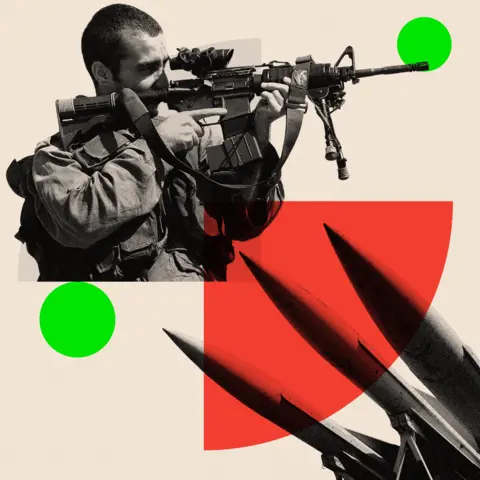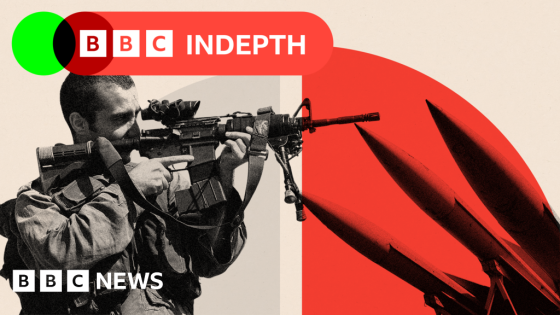 BBC
BBCOn 1 October, Israel began a ground invasion of southern Lebanon. Shortly afterwards, Iran launched more than 180 missiles towards Israel.
With the war in Gaza still ongoing, fears of an all-out regional conflict in the Middle East remain high.
How big a danger is this threat of further escalation? For BBC InDepth, we asked a range of experts to share their analysis of why the conflict has escalated, and what might happen next.
What is Israel’s long-term goal in Lebanon?

Israel seems to have upgraded its goals from weakening Hezbollah to enforce a ceasefire deal that secures Israel’s north, to seeking to neutralise Hezbollah permanently. Despite inflicting huge losses on Hezbollah, Israel’s military campaign won’t make Hezbollah disappear.

It’s hard to know the difference between government rhetoric and what it will do on the ground. What they say they’re doing is removing the threat of Hezbollah to protect civilians in Northern Israel who live in sovereign territory and need to return after being displaced for a year as a result of ongoing rocket fire from Hezbollah, who joined the fight with Hamas after October 7. But this government also has religious forces setting forth, not a strategy, but a cosmic vision of conquest. And therefore we can’t rule out that there may be an expansionist ethos.

Israel would like the Lebanese state to reassert authority over Hezbollah. This reminds me of the 1982 Israeli ground war in Lebanon against the Palestinian Liberation Organisation. That didn’t turn out so well in the long-term for Israeli citizens living near the Lebanese border. Israel in this case will need to focus on the short-term gain of calming the situation enough that its displaced 60,000 residents of northern Israel can return to their homes.
Has this already started to redraw the map of the Middle East? If so, how?

The balance of power in the Middle East is beginning to shift in a way that is weakening Iran’s influence in the region. But any such change in the status quo is a process that will take a long time to materialise.

It’s too soon to reach that conclusion, but what’s certain is the Iran-led axis is reeling and Israel seems to have achieved some significant tactical gains. Whether it can translate those to strategic gains through diplomacy remains to be seen.

Not the map, but the power balance for sure. For the past 20 years, Iran and its proxies (Hamas and Hezbollah) on one side and Israel on the other have held each other to a draw, meaning there was mutual deterrence. That was shattered on 7 October, and Israel is trying to get the upper hand.

It’s too soon to tell. My feeling is, talk to me in two weeks or talk to me in a year and we will know if there’s been a re-occupation of Southern Lebanon… At the same time, you have the conflict with Iran, but I don’t think they’re trying to redraw the borders in the Middle East.
What does this mean for nuclear enrichment or the prospect of nuclear weapons in Iran?

The fact that Iran has clearly lost Hamas and Hezbollah as effective deterrents means that an increasing number of figures in the Iranian establishment are going to want to develop a nuclear weapon.
However, what does this mean in practice? And when will Israel find out? Israeli intelligence is pretty good in Iran – if Iran does start building a weapon, will Israel find out next week? If Iran goes ahead with this, it enters a very risky area. But as things stand, Iran’s conventional military capabilities are a joke compared to Israel’s, so it has relied on non-traditional means such as militias – which have proved to be of little use.
The nuclear ambition in Iran is a concern for Israel for obvious reasons. Anti-Israel animus remains central to the regime. For Ayatollah Ali Khamenei, the project to destroy Israel is the oldest and most central demand. It’s the only project he’s been able to advance towards, and the only thing the Islamic Republic is a leader in is the anti-Israel project – it’s the only state in the world that shoots at Israel.
However, there is a more pragmatic element within the Iranian political establishment, which often gets forgotten, and which believes Iran has no business fighting the Palestinian war for the Palestinians.

Iran will do whatever it takes to secure its nuclear programme. It will perceive an Israeli attack on its nuclear programme as an existential threat.

It may be that in the Iranian perception, the only thing they’ve got left that could potentially genuinely be a game-changer, is to go nuclear. I don’t know what exactly that might mean – maybe they have a capability already, and they could demonstrate it by conducting a nuclear test in the desert somewhere.
Does the spreading of conflict make it harder for Israel to achieve its aims in Gaza?

Israel’s widening campaign is sowing increasing anger among the populations in the Middle East who are sympathetic to the Palestinian cause. This makes achieving peace in the future harder.

Certainly, a larger war will spread Israel thin, especially when it has yet to achieve the eradication of Hamas in Gaza. However, Israel continues to have the military support of the United States.

Israel has been fighting in Gaza for a year and there has been major destruction of Hamas brigades and a severe loss of fighters. The biggest problem for achieving its aims in Gaza is that Israel has no vision for an alternative governing force. The problem isn’t that Israeli forces are being spread thin, but that Israel needs a political strategy for a government framework that leads to Palestinian self-determination and has international and Palestinian buy-in. Without that, Gaza will be a constant threat and a constant military drain.

Israel cannot achieve its aims in Gaza because it doesn’t have a political aim – it never did, and it went to war without one. And this will potentially be its Achilles’ heel. But Netanyahu probably doesn’t feel like he needs to seek any kind of political outcome because he can go to endless war, and yet still have much of the Western world on his side.
Will whoever wins the US election in November be able to exert any influence over the Israeli military operation?

Any American president can exert influence on Benjamin Netanyahu if he or she wants to. But none of them have thought it beneficial. Kamala Harris has less long-term baggage than Joe Biden in terms of wanting to give unconditional levels of support to Israel, but her party is internally divided – on one side there is strong support for Israel and on the other side, some are calling for an arms embargo. Those are a minority, but the Democratic voices calling to constrain Israel somehow are growing significantly. Trump is a wildcard. He talks big, but he doesn’t like America being dragged into wars.

I think Donald Trump might exert more influence than Kamala Harris. He is more pro-Netanyahu, or at least pro-right-wing Israel, but he’s very much against dragging the US into war.

Any US administration that is providing $10bn (£7.6bn) to help Israel’s military operations will have leverage, especially as Israel’s economy is suffering. The question is whether there is any US politician in a position of real authority who is willing to absorb the political cost domestically of using that leverage. At present there is not in either party. There is no Ronald Reagan or George HW Bush in prospect.
What are the potential ways wider conflict could be averted?

They’re harder to pinpoint with every missile fired or air strike launched.

I am very pessimistic about the prospects of de-escalation… most likely the perception within the Israel Defence Forces and at the political level within Netanayhu’s war cabinet is that they have the momentum. In warfare, when one side believes it has the momentum against its adversary, you don’t want to give it up, because you can continue to put pressure on your enemy.

This conflict will not be won militarily by any actor involved. Ultimately, diplomacy is the only way towards stability.

There are two obvious off-ramps. The first is for Israel to accept a ceasefire in Gaza that will pull back forces to agreed locations so that humanitarian aid can move and that allows for a new Palestinian governing authority that Palestinians, not Israelis or Americans, will choose. The second is for a ceasefire in Lebanon that will see Hezbollah cease rocket/missile attacks on Israel in return for Israel halting its airstrikes and ground incursions.

I don’t think Netanyahu is looking for off-ramps. But the one potential off-ramp is if there were major concessions from Iran, a major turnaround in Iranian policy, starting with the nuclear programme but including the support for Hezbollah and Hamas. I can’t imagine it happening, but that would be an off-ramp.

In Lebanon, the off-ramp is for a ceasefire and an agreement on new security arrangements in the south. I don’t think this option is available before the end of this year and while we’re awaiting a new US administration.

There are no off-ramps here unless the US and other major Western governments make it their business to change the direction of events on the ground in the Middle East.
Dahlia photo credit: Oren Ziv
Top photo credit: Getty
BBC InDepth is the new home on the website and app for the best analysis and expertise from our top journalists. Under a distinctive new brand, we’ll bring you fresh perspectives that challenge assumptions, and deep reporting on the biggest issues to help you make sense of a complex world. And we’ll be showcasing thought-provoking content from across BBC Sounds and iPlayer too. We’re starting small but thinking big, and we want to know what you think – you can send us your feedback by clicking on the button below.
Source Agencies




